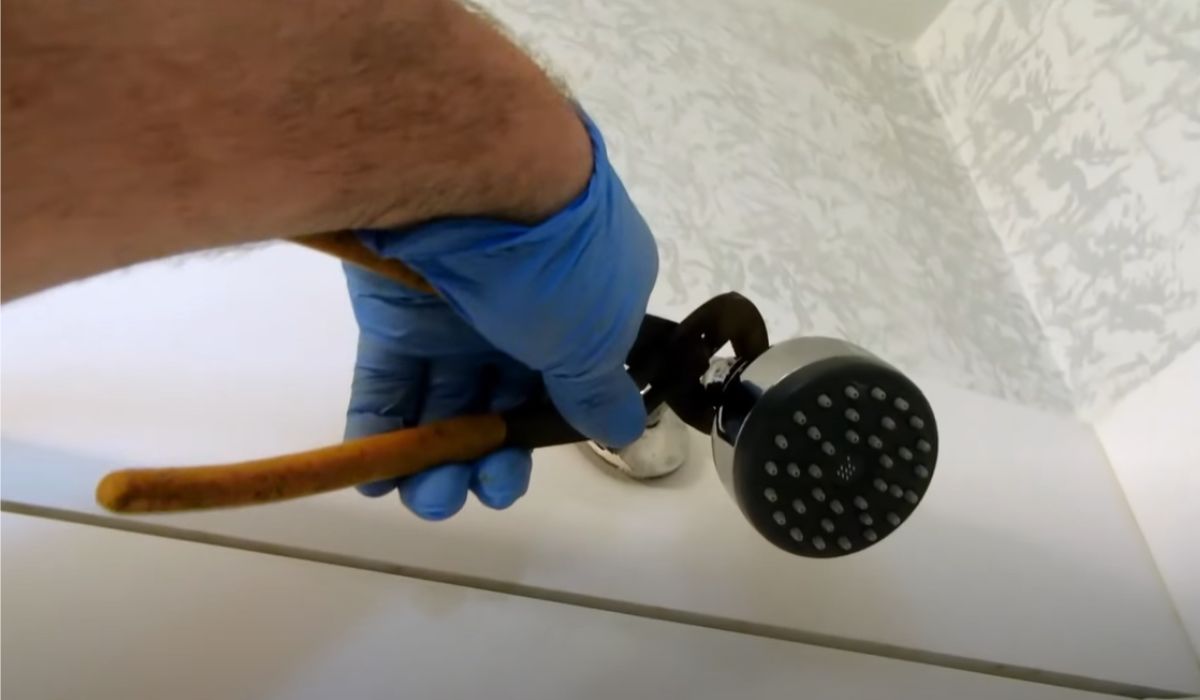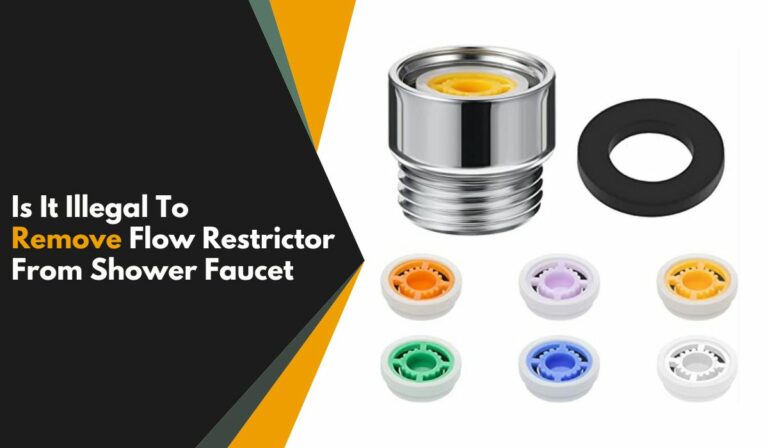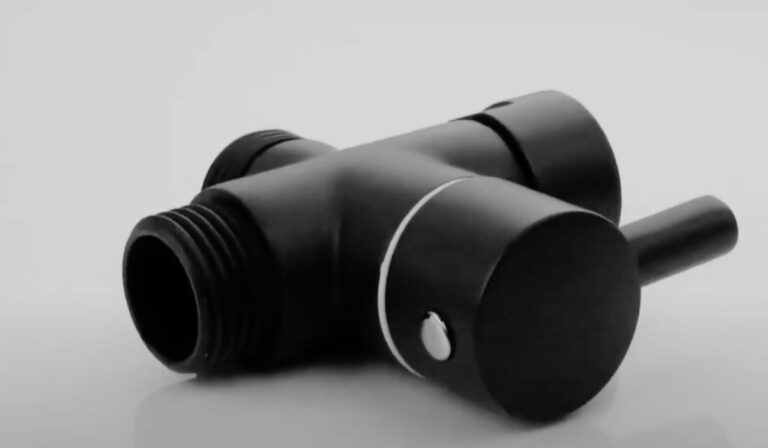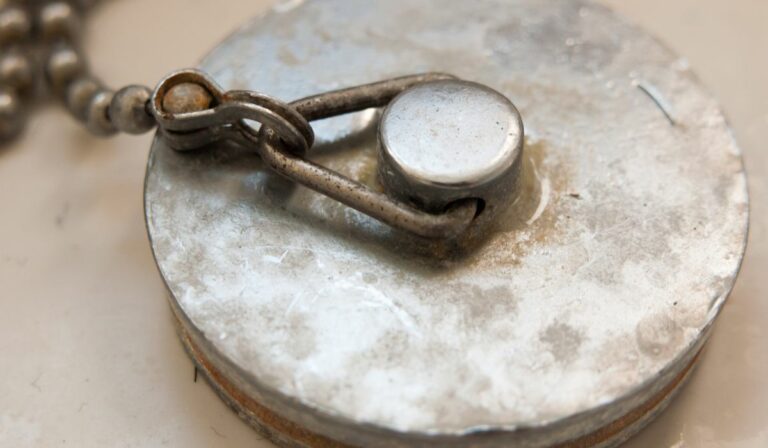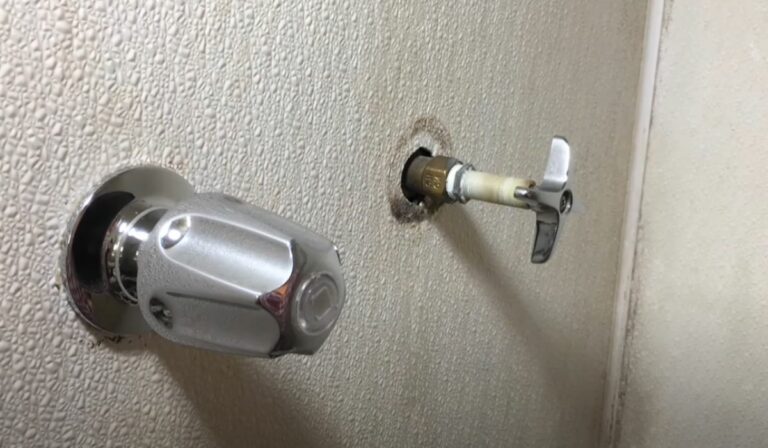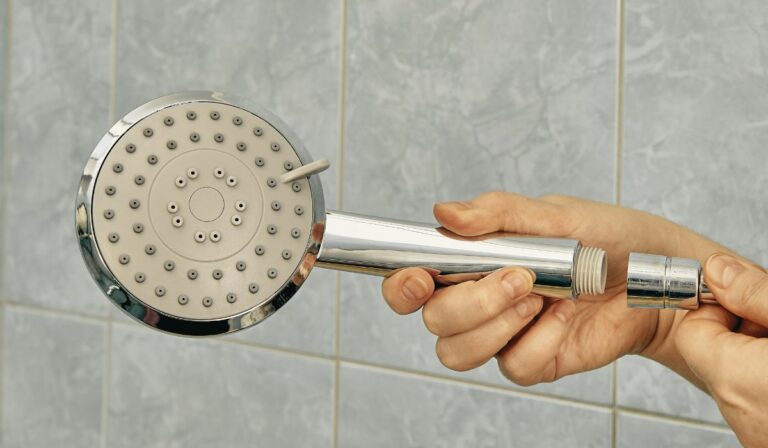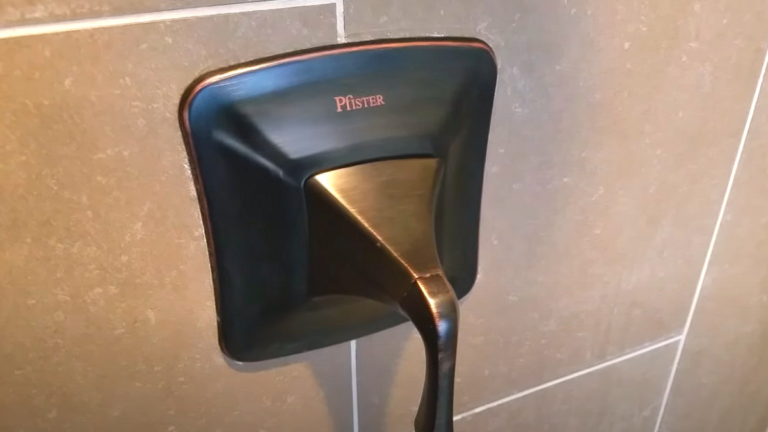Exactly Why Does My Shower Sound Like a Kettle? (Find & Fix)
This could be pretty frightening. Hearing a high-pitched squeal from the plumbing system. Something almost similar to a kettle. This could be when you are taking a shower or all of a sudden, even when the shower is turned off. In any case, this is alarming.
But what could be going wrong and exactly why does my shower sound like a kettle? If that’s what you are wondering now, I’ve news for you!
A shower may sound like a kettle due to several minor or major plumbing problems. Mainly it happens from high water pressure. But the problem can also be build-up in the aerator/shower head/shower pipe/shower hose, worn-out washer, cracks/holes in the shower head, and more.
In this guide, I want to go through each of these potential culprits and find some solutions separately.
Why Does It Sound Like a Kettle and How to Fix It?
Exactly why does my shower sound like a kettle, let’s get identifying the main culprit out of the way first and foremost.
Your Shower Will Sound Like a Kettle If:
There is more to this issue. But mostly you would find these causes. In some cases, the severity of the underlying problem will determine if you should consider solving it yourself or immediately call a professional.
If the shower sounding like a kettle is not the only problem, you should consider an expert inspection.
Water Pressure Problems in Shower Can Cause the Kettle Sound
Hearing different types of noises substantially in a bathroom is not a good sign. You may hear a kettle-like sound but also a gurgling water noise.
And it is also possible that the pipes will make a humming sound whenever you turn on the shower, which is a concerning warning you must take seriously.
So exactly, why do the pipes hum when the shower is on?
Pipes hum when the shower is on if the water pressure in that house is extremely high. The normal range of water pressure is generally up to 80 PSI. Anything more than that requires the inspection of a plumber as soon as possible.
Consider Installing a Water Pressure Regulator
Anyone as soon as they get to the point of asking themselves why is my shower making a high-pitched noise and know that the system lacks a water pressure regulator, should get it installed instantly.
Not only will it get rid of the annoying noise but it will also reduce the water pressure within a safer range before entering your home.
Clean the Aerator
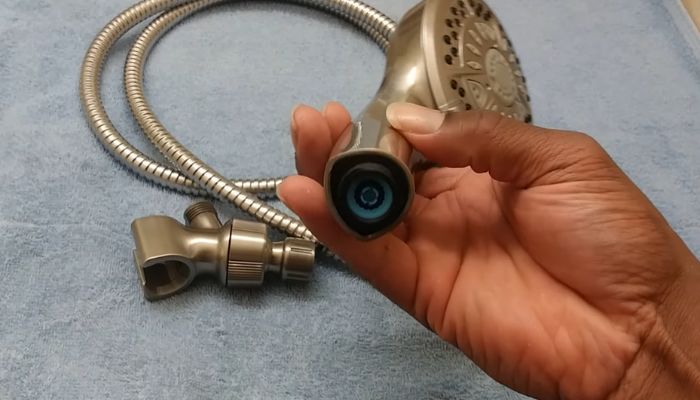
If you have wondered how to fix a whistling shower, then don’t forget to check the aerator of the shower head.
This is basically a tiny screen that stays at the very end of the head. And it works to break up the water into tiny droplets. A clogged and dirty aerator will result in increasing the water pressure, which creates a whistling and even kettle-like sound.
To clean the aerator, you just need to carefully detach it from the shower head. Then soak the component in a bowl filled with white vinegar. Leave it for the night and rinse the next morning before reattaching back to the shower head.
Replacing the Shower Head
You may have the wrong showerhead. Perhaps the water pressure in your house is not working well with your existing shower head. Make sure the shower head you are using can take the pressure. And if not, you need to replace the shower head.
Faulty Washers and Loose Connections Can Cause Noise
There is a water-tight seal inside the shower head that can cause a kettle-like sound or whistling shower. With damaged water seals, how do you stop your shower from whistling?
To stop the shower from whistling, you need to consider tightening the connection point and replacing damaged washers. Tightening the connection is a straightforward process.
To Tighten Connection Points:
If the problem still exists, check the washer of the showerhead. Worn-out washers are unable to create a water-tight seal. And so water comes out, making the whistling sound. You may experience serious leaks in the head if the problem is not taken care of soon.
To Replace the Washers:
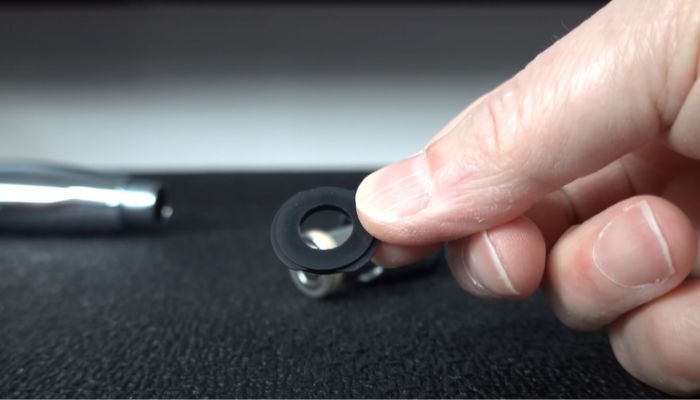
Hole or Crack in Shower Head
This is about a shower head that falls off accidentally or is quite old. Over time, the shower head can wear and tear, causing holes in the body. If this is a new showerhead, a manufacturing defect can also be the case.
With a shower head that has holes and cracks, you will hear a lot of annoying noise. Also, there will be a substantial amount of water wastage as the holes will cause leakage. No matter what has caused the cracks, you need to change the shower head with a new one.
Clog in the Shower Head/Hose/Pipe
The pipes inside your bathroom making sounds when you take a shower is a huge red flag. You are not supposed to listen to any noise when water is flowing through those pipes.
Now why is that happening and exactly what causes bathroom pipes to whistle or similar weird noises?
The forceful flow of water through a tiny opening is the main cause for bathroom pipes to whistle. Where the original plumbing part might not have been meant for this forceful water flow. This could also be a result of build-up or wear and tear in the valves.
If you have recently installed a shut-off valve for the shower, make sure the installation was done right. This can also cause the sounds. And if the shower head, hose, or pipes have accumulated mineral buildup, then you need to clean it. The latter is actually the more common reason.
Depending on the type of sound you are listening to, the problem is detectable as well. For example, gurgling noise during your shower. Exactly why doyouheargurgling noises whenyou shower?
You might hear such noises when you shower due to clogs existing inside the pipes. Over time, air pockets can also surround the entire clog, worsening the situation. As a result, the air that was trapped in will start to exit and that’s basically creating the sound.
This is quite common among people who live in hard water areas. As hard water can cause clogging in shower pipes, heads, and hoses quickly.
To Clear the Clog:
Tool – Vinegar, Toothpick or Anything with Pointy Edge, Bowl, Wrench/Pliers, Rag & Toothbrush.
Faulty Diverter, Valve, or Cartridge
The shower valve, cartridge, or diverter valve can also be responsible for the kettle-like sound. Exactly how to stop a shower from making noise if one of these is at fault?
Shower Valves
With worn-out shower valves, you want to make sure that the part can engage properly when you use the handle of the shower.
Often to repair a broken shower handle you consider replacing the shower valves. If the installation was not done right, it will lead to incorrect engagement of the component. And that can result in a kettle-like noise.
The shower valve wearing out can also be the potential culprit. You may need to replace the shower valve.
While discussing a hard-to-turn-off single-handle shower faucet, I’ve given the replacement process, you can check that. However, if this involves opening up the area of the wall, it’s better to let the professional handle the task.
Shower Cartridge
A clogged cartridge can also cause a kettle-like sound in a shower system. This is basically a part of the shower valve. So while accessing the valve you can locate it easily.
To Clean a Clogged Shower Valve Cartridge:
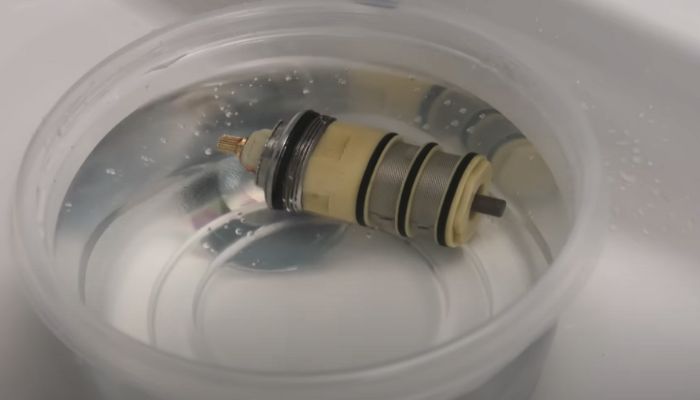
If after cleaning the cartridge, the kettle-like sound still exists, you may need to replace it. I have covered a general guideline of cartridge replacement while discussing a single-handle shower faucet that has no hot water.
Diverter Valve
This could be why your new showerhead is squealing. The diverter valve might be damaged. To check, you simply need to turn on the shower and push or pull the diverter. And then check if the sound is still there.
If not, this is the problem creator, and you need to replace the diverter. A problematic diverter can also be the case for a leaking spout.
Damaged Thermostat Might Be the Cause
This one can be intimidating, you might be able to hear the sound of boiling water. What could be wrong and exactly why does a shower sound like a boiling kettle?
Your shower will sound like a boiling kettle usually when a switch or relay is stuck in the ON position, even when the shower is turned off. This will not only keep the component powered but also cause a TCO failure at any time.
It is also possible that you are listening to whistling shower when off because the water is actually boiling. You must check and find exactly why the shower water is boiling, as this can get dangerous really quickly.
Your shower water might be boiling due to a thermostat failure. This type of failure is serious as you can experience scalding hot water and burn your skin unknowingly.
Fixing a scalding-related issue is quite tricky. And dealing with a damaged thermostat is not a simple task to try yourself. So I would suggest you take this as a sign to call a professional as soon as possible.
Shower Pump Issues
Another common reason behind a shower that sounds like a whistle is the shower pump. Having damaged bearings or impellers can cause it to squeal or whine.
Bearings can wear out over time and the impeller might be affected by buildup. You will probably hear a screech whenever water moves. And this refers to the difficulty that the pump is facing to allow the water to travel.
Often such noises are a strong indicator that you need to replace the shower pump. It is also possible that the shower pump installation was done incorrectly. And this leads to vibration and then sound.
Placing the pump on a wooden floorboard is one of the installation mistakes some conduct. It is also possible that the pump is not properly fastened to the surface, making scope for the noise.
Painted Showerhead and Narrow Pipes
These are rare cases but not absolutely ignorable. It is possible that the showerhead you are using is painted and this is the reason why it is making those weird sounds.
The water flow gets restricted, causing noise. Removing the paint or changing the shower head will solve the problem.
Narrow or slim pipes can also be the reason behind restricting proper water flow due to decreased water pressure. This can result in a whistling noise.
Installing a larger piper to the existing slim pipe can help the system become compatible with the water pressure. And this may solve the noise issue.
Wrapping Up
So why does my shower sound like a kettle? I hope you have your confusion sorted. Don’t wait and take the necessary action to get your shower fixed. A kettle-like sound of a shower can get dangerous quite quickly, especially if it’s related to an overheating cause.
It is also possible that the pipe is damaged. This can turn into a nightmare if eventually, the damage leads to a burst flooding your entire house.
So whatever the root cause is, you don’t want to leave it without fixing it for later. I will see you in my next guide, take care!

